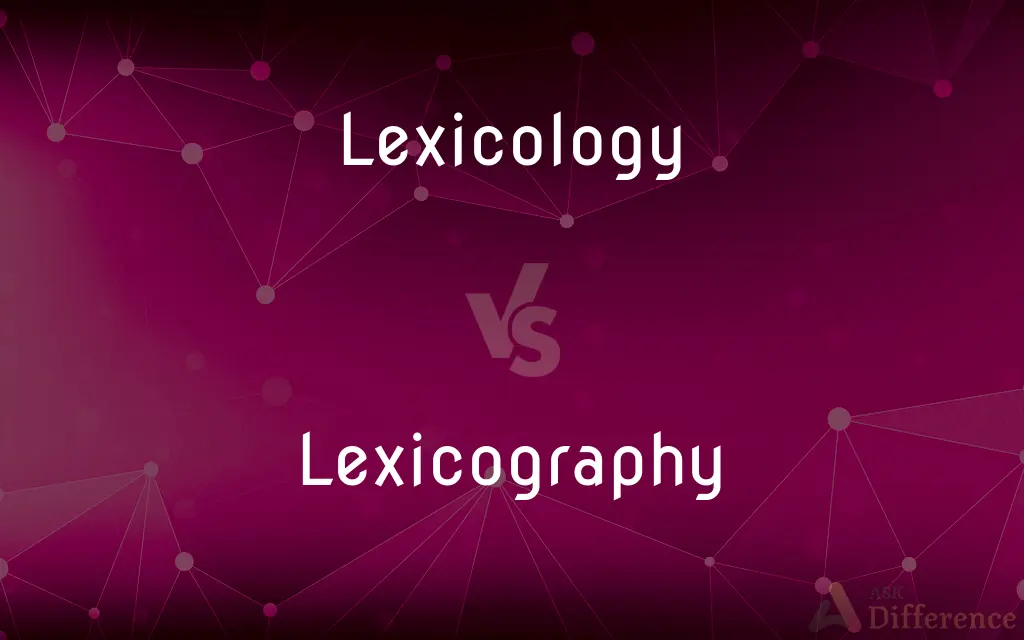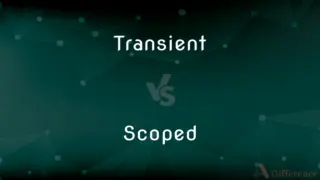Lexicology vs. Lexicography — What's the Difference?
By Fiza Rafique & Maham Liaqat — Updated on March 29, 2024
Lexicology is the study of words, their nature, and meaning, while lexicography is the art of compiling dictionaries.

Difference Between Lexicology and Lexicography
Table of Contents
ADVERTISEMENT
Key Differences
Lexicology delves into the analysis and structure of words, including their origins, development, meanings, and relationships within a language. It explores how words function in speech and writing, covering various aspects like etymology, semantics, and morphological structure. On the other hand, lexicography focuses on the practical application of this knowledge through the compilation, design, and editing of dictionaries. It involves decisions on which words to include, their definitions, pronunciation, usage, and etymological information.
While lexicology is a theoretical and analytical field within linguistics, aiming to understand the systematic and inherent features of words as linguistic units, lexicography is more practical and applied. Lexicographers use the insights and findings from lexicological studies to create tools (dictionaries) that serve as references for language learners, writers, researchers, and anyone interested in the meanings and usage of words.
In lexicology, scholars might debate the nuances of a word's meaning, its evolution over time, or its role in constructing sentences. This discipline provides the foundation for understanding how language operates at the word level, influencing fields such as language teaching, computational linguistics, and translation studies. Conversely, lexicography is about making this knowledge accessible and usable, translating the complex details of language into user-friendly formats.
The outcome of lexicological research is often seen in academic papers, lectures, and theoretical discussions. These insights feed into lexicographical work, which culminates in the publication of dictionaries and glossaries that laypeople and specialists alike use. While lexicology can seem abstract, focusing on linguistic phenomena without immediate application, lexicography delivers concrete products designed to be practical tools for language use.
Both fields, while distinct, are deeply interconnected. Effective lexicography relies on the comprehensive understanding of language that lexicology provides. Similarly, advances in lexicography, such as the development of new dictionary formats or the identification of previously undocumented words, can inspire and inform lexicological research, creating a dynamic interplay between theory and practice.
ADVERTISEMENT
Comparison Chart
Definition
The study of words, their meanings, origins, and relationships within a language.
The art and science of compiling dictionaries.
Focus
Theoretical analysis of words and their structures.
Practical application in compiling and editing dictionary entries.
Outcome
Academic papers, theories, and linguistic models.
Dictionaries, glossaries, and other reference materials.
Primary Concern
Understanding how words function in language.
Providing accurate and accessible definitions and word usage information.
Tools and Techniques
Linguistic analysis, etymological research, semantic studies.
Lexical databases, corpus analysis, editorial decisions.
Compare with Definitions
Lexicology
The study of how words interact within a language's grammar.
Lexicology examines the shift in word usage in different linguistic contexts.
Lexicography
The craft of compiling and editing dictionaries.
Lexicography has evolved to include multimedia elements in digital formats.
Lexicology
The branch of linguistics that studies the structure and meaning of words.
Lexicology helps us understand why synonyms can carry different connotations.
Lexicography
The discipline of detailing correct word usage.
Lexicography provides guidelines on word selection for effective communication.
Lexicology
The analysis of word formation and usage in a language.
Through lexicology, we explore how words evolve over time.
Lexicography
The art of designing useful reference works for language users.
Modern lexicography seeks to address the needs of diverse users.
Lexicology
The investigation into the origins and etymologies of words.
Lexicology reveals the historical layers within our vocabulary.
Lexicography
The process of documenting words and their meanings.
Lexicography involves meticulous research to capture language as it is used.
Lexicology
The examination of semantic relationships between words.
Lexicology categorizes words by their meaning, usage, and relationships.
Lexicography
The practice of collecting and organizing lexical items.
Lexicography bridges linguistic research and everyday language use.
Lexicology
Lexicology is the branch of linguistics that analyzes the lexicon of a specific language. A word is the smallest meaningful unit of a language that can stand on its own, and is made up of small components called morphemes and even smaller elements known as phonemes, or distinguishing sounds.
Lexicography
Lexicography is the study of lexicons, and is divided into two separate but equally important academic disciplines: Practical lexicography is the art or craft of compiling, writing and editing dictionaries. Theoretical lexicography is the scholarly study of semantic, orthographic, syntagmatic and paradigmatic features of lexemes of the lexicon (vocabulary) of a language, developing theories of dictionary components and structures linking the data in dictionaries, the needs for information by users in specific types of situations, and how users may best access the data incorporated in printed and electronic dictionaries.
Lexicology
The branch of linguistics that deals with the lexical component of language.
Lexicography
The process or work of writing, editing, or compiling a dictionary.
Lexicology
The part of linguistics that studies words, their nature and meaning, words' elements, relations between words including semantic relations, words groups and the whole lexicon.
Lexicography
(uncountable) The art or craft of compiling, writing, and editing dictionaries.
Lexicology
(countable) A specific theory concerning the lexicon.
Lexicography
The scholarly discipline of analysing and describing the semantic, syntagmatic and paradigmatic relationships within the lexicon (vocabulary) of a language and developing theories of dictionary components and structures linking the data in dictionaries.
Lexicology
The science of the derivation and signification of words; that branch of learning which treats of the signification and application of words.
Lexicography
(countable) A dictionary, a lexicon, a wordbook.
Lexicology
The branch of linguistics that studies the lexical component of language
Lexicography
The art, process, or occupation of making a lexicon or dictionary; the principles which are applied in making dictionaries; as, with so many words lexicography can be interesting in parts but at length is rather tedious labor.
Lexicography
The act of writing dictionaries
Common Curiosities
What is lexicology?
Lexicology is the study of words, their meanings, origins, and how they function within a language.
Why is lexicology important?
It provides essential insights into language structure, development, and usage, informing various linguistic and educational practices.
Can you pursue a career in lexicography?
Yes, as a lexicographer, focusing on dictionary compilation, editing, and linguistic research.
How does lexicography differ from lexicology?
Lexicography focuses on compiling dictionaries and reference materials, while lexicology is the theoretical study of words and their usage.
What skills are needed for lexicography?
Skills include linguistic knowledge, research ability, attention to detail, and understanding of dictionary users’ needs.
What impact has digital technology had on lexicography?
Digital technology has revolutionized lexicography, allowing for interactive, regularly updated, and accessible online dictionaries.
Can lexicography be done for new languages?
Yes, lexicography plays a crucial role in documenting, preserving, and teaching new or less-documented languages.
What challenges do lexicographers face?
Challenges include keeping up with language evolution, deciding which words to include, and addressing the needs of diverse users.
What types of dictionaries are there in lexicography?
There are many, including general, historical, etymological, slang, and bilingual dictionaries, each serving different purposes.
How do lexicologists and lexicographers work together?
Lexicologists provide the theoretical insights that lexicographers apply in creating dictionaries and language resources.
What are the outcomes of lexicological research?
Outcomes include academic papers, theories on word usage and evolution, and contributions to linguistic education.
How do cultural changes affect lexicography?
Cultural shifts introduce new words and meanings, requiring dictionaries to be updated to reflect current language use.
How does one become a lexicographer?
Typically through studies in linguistics, language, or a related field, coupled with specialized training or experience in dictionary compilation.
How has the internet influenced lexicology?
The internet has provided lexicologists with vast resources for studying language patterns, usage, and evolution on a global scale.
Is lexicology only concerned with English?
No, lexicology applies to the study of words and their usage across all languages.
Share Your Discovery

Previous Comparison
Transient vs. Scoped
Next Comparison
Warehouse vs. TerminalAuthor Spotlight
Written by
Fiza RafiqueFiza Rafique is a skilled content writer at AskDifference.com, where she meticulously refines and enhances written pieces. Drawing from her vast editorial expertise, Fiza ensures clarity, accuracy, and precision in every article. Passionate about language, she continually seeks to elevate the quality of content for readers worldwide.
Co-written by
Maham Liaqat













































